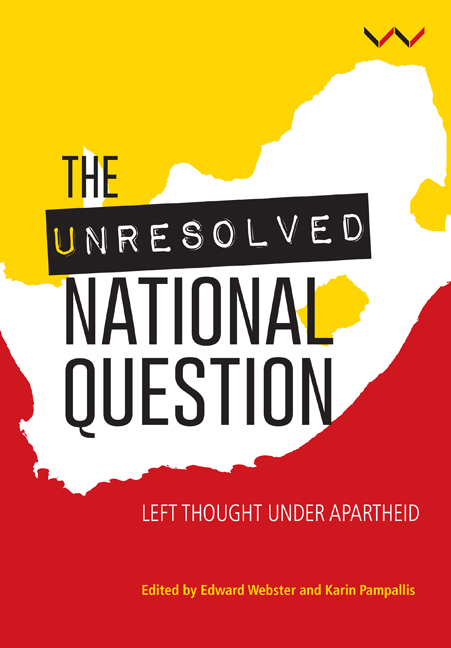Book contents
- Frontmatter
- Contents
- Acronyms and Abbreviations
- Preface: Edward Webster and Karin Pampallis
- Introduction: Revisiting the National Question
- PART ONE KEY FOUNDATIONAL TRADITIONS
- Chapter 1 Decentring the Question of Race: Critical Reflections on Colonialism of a Special Type
- Chapter 2 The African National Congress: Social Democratic Thinking and the Good Society, 1940–1962
- Chapter 3 Oliver Tambo and the National Question
- Chapter 4 The Unity Movement and the National Question
- Chapter 5 The Africanist Turn in South African National Question Discourses
- PART TWO CONTINUITY AND RUPTURE
- Biographical Notes
- Index
Chapter 3 - Oliver Tambo and the National Question
from PART ONE - KEY FOUNDATIONAL TRADITIONS
Published online by Cambridge University Press: 21 April 2018
- Frontmatter
- Contents
- Acronyms and Abbreviations
- Preface: Edward Webster and Karin Pampallis
- Introduction: Revisiting the National Question
- PART ONE KEY FOUNDATIONAL TRADITIONS
- Chapter 1 Decentring the Question of Race: Critical Reflections on Colonialism of a Special Type
- Chapter 2 The African National Congress: Social Democratic Thinking and the Good Society, 1940–1962
- Chapter 3 Oliver Tambo and the National Question
- Chapter 4 The Unity Movement and the National Question
- Chapter 5 The Africanist Turn in South African National Question Discourses
- PART TWO CONTINUITY AND RUPTURE
- Biographical Notes
- Index
Summary
Oliver Tambo's steadily widening and inclusive concept of the nation in the history of the African National Congress (ANC) is a familiar narrative. Pixley ka Isaka Seme's rallying cry in 1911 – ‘We are one people. These divisions, these jealousies are the cause of all our troubles and of all our ignorance today’ – attracted traditional leaders as well as educated liberals and nationalists. It inspired the many generations that followed the launch of the South African Native National Congress in 1912 (renamed the African National Congress in 1924).
Despite its uneven and slow progress against racial hostility and segregation in the years that followed, the ANC was the organisation that young Africanists joined some thirty years after its inception. By the 1940s, however, the voice of the ANC had become muted, confined to eloquent ‘cap-in- hand’ petitions. That approach had failed to counter increasing legislative aggression against blacks, and Africans in particular. The 1936 Natives’ Representations Act had removed the direct vote from the few black men who (in the Cape Province only) were still entitled to a qualified franchise, whereas all white adults, women and men, had access to the vote.
In 1949, the year after the apartheid government was voted into power by a white electorate, the ANC Youth League issued its programme of action. Founded by Walter Sisulu, Oliver Tambo and Nelson Mandela, the ANCYL was first led by the passionately articulate political philosopher and law clerk, Anton Lembede. The young, predominantly male, African-elite initiators of the Youth League concluded that the answer lay in mass action.
Above all, they were unapologetically Africanist. ‘The problems of African churches, trade unions, teachers, traders, industrialists, farmers and peasants represent merely certain aspects of our colonial national struggle which is one, single and indivisible,’ asserted Lembede (1944) in sketching out the task of uniting a nation.
The formation of the ANC Youth League was strongly informed by a rejection of the paternalism of missionaries and liberals, who assumed that Africans had a primitive, simple culture riddled by superstition and unbridled self-indulgence and were unable to discern the civilising influence of the values of indigenous humanism, and the sophistication of oral skills in the transmission of knowledge.
- Type
- Chapter
- Information
- The Unresolved National Question in South AfricaLeft Thought Under Apartheid, pp. 60 - 76Publisher: Wits University PressPrint publication year: 2017



